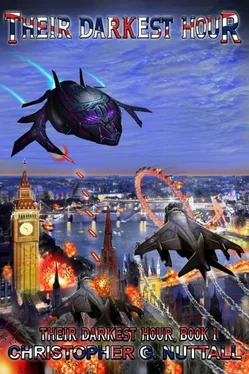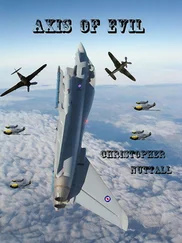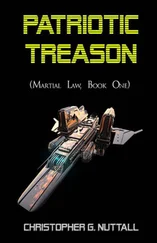“I… thank you,” she managed. Normally, a pilot bailing out of an aircraft would have been tracked by ground-based radar stations and a SAR helicopter dispatched from the nearest base. Now, she had the unpleasant feeling that the rest of the RAF had more important things to worry about than a single Typhoon pilot. The explosions she’d seen as she drifted down to the field suggested that the entire country was under attack. “Do you have a mobile phone?”
“I tried to call an ambulance when I saw your parachute,” the farmer said. He looked older than her father, but there was a toughness around him that reminded her of the RAF Regiment soldiers who guarded the RAF’s airbases. His face was tanned by the sun. “There’s no signal at all.”
Somehow, Alex wasn’t surprised. The unknowns — whoever they were — had to have taken out the communications satellites, as well as jamming ordinary radio frequencies. There was no reason why they couldn’t jam mobile phones as well. She cursed under her breath as she realised that she wasn’t entirely sure where she was, or how to report in to whatever remained of her unit. The country was at war and she had enlisted to defend it. She needed to return to the base. And that might be impossible.
“I can take you down to the farm,” the farmer offered. He held out a calloused hand. “My name’s Giles, Giles Smith. I own the land about here.”
“Alex,” Alex offered, as they shook hands. “I didn’t mean to land on your farm…”
“Don’t worry about it,” the farmer said. He frowned, for a long moment. “I don’t suppose you know what those flashes I saw in the distance were?”
Alex filled him in on what little she knew as they walked down towards the farmhouse. It was a neat little building, surrounded by a field of sheep and cows, almost like something from a bygone era. She would have been charmed if she hadn’t been so worried about the situation — and the smell from the fields. The people who suggested that humanity should abandon technology and go back to the land had never smelled the countryside. She was happy with air conditioning and filtering.
Inside, she allowed the farmer’s wife to give her a cup of tea while she tried to call the base. The telephone line buzzed and clicked alarmingly, and then went dead, without even a dial tone. At Smith’s suggestion, she tried the internet and was pleasantly surprised to discover that the farmhouse had broadband. Smith explained, when she asked, that the farmhouse often played host to young people and they all demanded internet access.
“And the wife likes watching streaming video from London,” he added with a wink. “I know better than to get in her way.”
Alex smiled as she tried to access MILNET through the internet connection. It should have accepted her password and allowed her access, but the link seemed to keep dropping out, as if some of the network nodes were malfunctioning. The unknown enemy had launched their attack without being detected, at least until it was far too late. There was no reason why they couldn’t have launched a cyber-attack as well and taken out most of the military’s secure network. The pilots had briefed that that was supposed to be impossible, but the unknowns had done far too much that should also have been impossible.
Finally, the system blinked up a warning; enemy troops in London and several other cities. Alex stared at the screen, not quite believing her eyes. How could anyone have simply landed in London? Where the hell was the rest of the RAF? The thought — the thought that she had been trying to avoid — floated back to the surface of her mind. She’d been blown out of the sky, along with her wingman. It was quite possible that the remainder of the RAF had met the same fate, or had been caught and destroyed on the ground. Who the hell were they fighting?
A set of general orders, directed to soldiers and TA reservists, flickered into existence. They were ordered to make their way out of the cities and rendezvous with officers at certain locations, each referred to with a different codename. Alex stared at them, before realising that whoever had taken command of the British military wouldn’t have wanted to put their instructions on the military network, no matter how secure it was supposed to be. The unknowns were probably monitoring every move they made.
But she had no idea where to go. The RAF had never anticipated needing to establish covert rendezvous points, certainly not since the end of the Cold War. She could find a list of military bases online, yet the chances were good that they had been destroyed or attacked and occupied by the unknowns. The unknowns… their enemy didn’t even have a face! Who the hell were they fighting?
She clicked on one of the options and an answer, of sorts, floated up in front of her eyes. Aliens. It seemed impossible, but so did the ghosts — the ghost aircraft that had blown her out of the sky and killed her wingman. She covered her eyes for a long moment, feeling the world spinning around her, and then looked back up at the screen. The damning words were still there.
“Aliens,” she whispered. How long had it been since she’d watched the television show where the RAF had accidentally shot down a UFO, only to find themselves caught in the middle of a war between two alien races? Years… she’d been a child at the time. “It’s not possible…”
But she could think of no other possible explanation.
Smith came back into the room and she filled him in, leaving out nothing. The farmer listened carefully, without interrupting, and then nodded. “I suspected as much,” he admitted, after she’d finished. “The BBC has been raving about monsters in London. They must have seen the aliens…”
“But what do they want ?” Alex asked, helplessly. “What does puny Earth have that they might want for themselves?”
“I have no idea,” Smith said. He shrugged. “Listen; I have to go to the Parish Council and tell them what’s going on. God alone knows what’s going to happen if London’s been occupied and we have to see to the crops. Lots of people might come running out of the cities and heading for the farms. I’d like you to come with me.”
Alex hesitated, and then nodded just as her stomach rumbled loudly. “Have something to eat first,” Mrs Smith said, firmly. “And you as well, Giles. You don’t eat enough as it is.”
* * *
Alex had never been to Long Stratton before, but Smith was happy to fill her in as they rumbled into the town and headed towards the Town Hall. Long Stratton was a civil parish with a population of roughly three thousand people, many of whom seemed to be thronging the streets as if they expected answers to be handed down from above. It struck her that many people around the country would have only seen explosions or heard thunderclaps, or perhaps listened to the ranting from the BBC — and wouldn’t have the slightest idea of what was going on. How long would it be, she asked herself, before confusion turned into panic? And how long would it be before the aliens made their demands known to humanity?
Smith parked by the Town Hall and nodded towards the old-style stone church. “There’ll be hundreds of people there, seeking guidance,” he said, softly. “Everyone knows everyone else here, not like in the big cities. We have a real community here, despite everything London can do to ruin it. Little green men aren’t going to take this place from us without a fight.”
Alex kept her opinions to herself. Some of the farmers would have shotguns, or hunting rifles, but most of the population would be unarmed. It was quite possible that they could produce Molotov Cocktails and other makeshift weapons, yet how could they stand up to the alien onslaught? The defenders of Long Stratton and its sister towns might just be marking themselves for extermination. What was her duty to them if they decided to challenge the aliens directly?
Читать дальше












